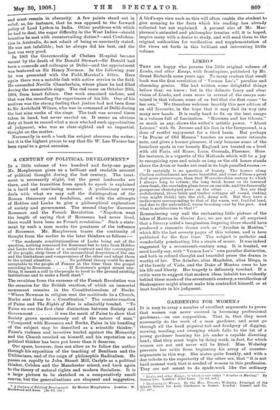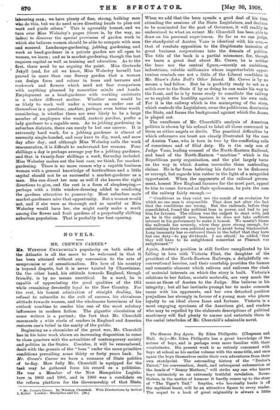GARDENING FOR WOMEN4
IT is easy to array a number of excellent arguments to prove that women can never succeed in becoming professional gardeners,—on one supposition. That is, that they must necessarily do the work of a man gardener, and must go through all the hard physical toil and drudgery of digging, mowing, weeding, and sweeping which falls to the lot of a young gardener learning his job under a capable directing head; that they must begin by doing work, in fact, for which women are not and never will be fitted. Miss Wolseley prevents her critic from beginning his array of counter- arguments in this way. She states quite frankly, and with a due tribute to the superiority of the other sex, that "it is not hard manual work that is needed of women in this profession. They are not meant to do spade-work like the ordinary " Limbo, and other Essay': to which is now added " Ariadne in Mantua." By Vernon Lee. London: John Lane. [Ss. ed. net.] t Gardening for Women. By the Hon. Frances Wolseley, Principal of the Glynde School for Lady Gardeners in Susses- London: Cassell and Co. [53. net.] labouring man ; we have plenty of fine, strong, hulking men who do this, but we do need more directing heads to plan out work and guide others." This is agreeably honest, and we turn over Miss Wolseley's pages (there is, by the way, no index) to discover the special provinces of garden work in which she believes women should be able to compete with men and succeed: Landscape-gardening, jobbing gardening, and work as head-gardener in a private garden are all open to women, we learn ; and so is market-gardening, though the last requires capital as well as training and education. As to the first, there need be no arguing the point. Miss Gertrude Jekyll (and, for all we know, Miss Wolseley herself) has proved in more than one Surrey garden that a woman can design form and colour in trees and terraces and rockwork and flowers which need not fear comparison with anything planned by masculine minds and hands. Employment as a head-gardener with working assistants is a rather different matter. Whether men would be as likely to work well under a woman as under one of themselves is a question; another, perhaps even better worth considering, is whether there are ever likely to be a large number of employers who would, eaeteris paribus, prefer a lady gardener to a capable man. As to jobbing gardening in suburban districts, there can surely be but one answer. It is extremely hard work, for a jobbing gardener is almost of necessity single-handed, and may have to dig, weed, and mow day after day ; and although Miss Wolseley calls the work remunerative, it is difficult to understand her reasons. Four shillings a day is perhaps average pay for a jobbing gardener, and that is twenty-four shillings a week, Saturday included. Miss Wolseley makes out the best case, we think, for market- gardening. There is no more reason why a capable business woman with a general knowledge of horticulture and a little capital should not be as successful a market-gardener as a man. She can direct her men as well if she knows the right directions to give, and the rest is a form of shopkeeping,— perhaps with a little window-dressing added in rendering the gardens attractive to passers-by. Most suburban male market-gardeners miss that opportunity. But a woman would not, and if she were as thorough and as careful as Miss Wolseley would have her, she might easily make a mark among the flower and fruit gardens of a perpetually shifting suburban population. That is probably her best opening.







































 Previous page
Previous page